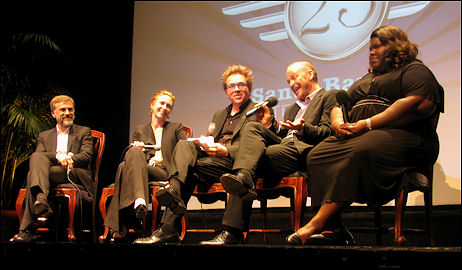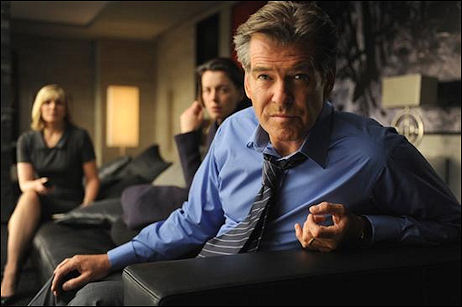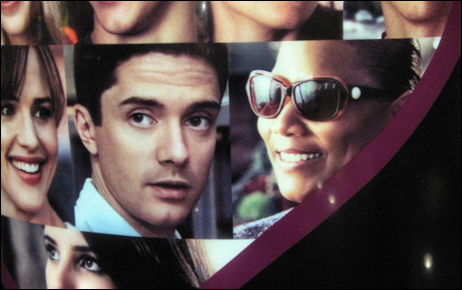Why do I feel slightly conflicted about this musical Haiti heart video? It’s well shot, well cut, well performed, etc. And everyone is coming from the right place. Except a voice is telling me it’s an advertisement for the performers first and a plea for donations second. (Or third.) I guess it’s also the sight of Jackostein at the original 1985 “We Are The World” recording. I was sorta with it until he showed. A bad taste.
Daily
The Group
Last night’s Santa Barbara Film Festival tribute was a presentation of Cinema Vanguard awards to Up In The Air‘s Vera Farmiga, An Education‘s Peter Sarsgaard, Inglourious Basterds costar Christoph Waltz and Precious star Gabby Sidibe. (Lovely Bones costar Stanley Tucci was also honored but in absentia — he’s directing a play in New York.)

At Santa Barbara’s Lobero theatre during last night’s Cinema Vanguard tribute: (l. to r.) Christoph Waltz, Vera Farmiga, Roger Durling, Peter Sarsgaard, Gabby Sidibe.
Festival chief Roger Durling handled the introductions, patter and chit-chat with smoothitude and high intelligence. It was all to the good.
Sarsgaard was the wittiest, I thought — he always is. Razor sharp, fast on his feet, straight-shooting, resistant to gushy platitudes, etc. I admired Waltz for his no b.s. answers and his general reluctance to grin too broadly. Farmiga’s plain-spokenness was equally appealing. And Sidibe was cool — she’s very bright, confident, likable.
Durling declined to ask Sarsgaard why he had a Bruce Willis shaved-head cut. That would have been the first question out of my mouth. He’s playing Hector Hammond in The Green Lantern — maybe he had to go tennis-ball because he’s wearing a wig or something.
It would have been cruel to ask Sidibe — by all indications an emotionally vibrant woman with a healthy outlook on everything — why she’s so excessively obese, but that, honestly, was all I could think of as I sat there (second row, right in front of Sharon Waxman ) last night.
Two-Hour Drive
My movie-monk life won’t be fulfilled, I’ve just decided, until I visit the site where Alfred Hitchcock and Cary Grant shot the crop-dusting scene from North by Northwest. For whatever reason I’ve never learned before today where the location actually was. It’s just east of the intersection of Corcoran Road and Garces Highway (155) outside the towns of Wasco and Delano, near Highway 46 off interstate 5.

By His Right Name
In a 2.12 Huffington Post-ing, Center for Transatlantic Relations senior fellow Michael Brenner explains how President Barack Obama has gradually revealed his true nature as that of a “moderate Republican before the species became extinct.”
The Obama enigma “grows day by day,” he writes. “Contradiction after contradiction, abrupt gear shifts, perpetual motion that never reaches a destination. ‘Obscene’ Wall Street bonuses suddenly transmute into well-earned rewards for a good-guy golfing buddy; the imperative to act boldly on the jobs crisis means placing it the callous hands of Max Baucus and Chuck Grassley of health care fame; the plotting of exit strategies from Afghanistan by 2011 becomes a ‘long as we have to’ occupation. All these contrapuntal reversals against a sound track of non-stop exhortation and a restless shuttling from one photo-op to another. Who is this guy, anyway?
“A few elements of Obama’s personality are now evident: a strong narcissistic streak, an ingrained sense of superiority, a nimbleness — intellectual and political — enabled by the incredible lightness of his conviction about anything, an audacious ambition yet no gumption for a fight. Behind these traits, there is something even more basic discernible. Obama is two people, one superimposed on the other.
“The visible surface man is the epitome of an enlightened, Ivy League, socially responsible liberal. This is Obama the community organizer (albeit an exceptionally non-confrontational one), Obama the African-American political activist who attends Jeremiah Wright‘s cosmopolitan church, Obama the orator who routinely hits the high ‘Cs’ of the call to conscience, Obama the optimist who appeals to, and for the better angels of our idealistic American selves. This is Obama the African-American who moved enough voters to be elected President of the United States.
“To this portrait, we must juxtapose the other Barack Obama who has surfaced as he quickly shed his ‘liberal’ skin amidst the trappings of the White House. This other personality, I contend, is the underlying one — truer to the man’s core nature.
“This is the Obama who twice in his young career sought out positions in big corporate law firms; this is the Obama who was raised by three Kansans who instilled in him conservative heartland values; this is the Obama who relishes wealth and what it can buy; this is the Obama who feels more at ease with his Wall Street buddies (Jaime Dimon, et al) playing golf than with anyone of the Move On American crowd; this is the Obama who chose as his trusted confidant that unscrupulous, liberals-be-damned fixer Rahm Emanuel; this is the Obama who absorbed the spirit of Ronald Reagan‘s America he himself has said stands as the model of inspirational leadership.”
Elley Pushback
Derek Elley‘s Variety review of The Ghost Writer “is nonsense…it’s Roman Polanski‘s best in years,” says an HE reader who’s also seen it. I’m also struck by an observation from Screen Daily‘s Fionnuala Halligan that the film “bears all the hallmarks of Polanski’s distinctive style” while Elley said that Polanski “brings not a jot of his own directorial personality or quirks” to the film. Disparate much?

(l. to r.) Kim Cattrall, Olivia Williams, Pierce Brosnan in Roman Polanski’s The Ghost Writer.
Here’s a rave by the Guardian‘s Peter Bradshaw. He calls it “a gripping conspiracy thriller and scabrous political satire, a Manchurian Candidate for the 2010s, as addictive and outrageous as the Robert Harris bestseller on which it’s based…Polanski keeps the narrative engine ticking over with a downbeat but compelling throb…this is his most purely enjoyable picture for years, a Hitchcockian nightmare with a persistent, stomach-turning sense of disquiet, brought off with confidence and dash.”
There also seems to be an undercurrent of approval in this analysis of the paranoid current in Polanski’s films by N.Y. Times contributor Dennis Lim.
At the very least I’m intrigued and encouraged. I’m also beginning to wonder if Elley’s review is another Hurt Locker-ish dismissal — a case of Elley once again being the odd man out?
Still Grates
Rachel Maddow‘s MSNBC interview with Quentin Tarantino begins with a clip from the infamous Donny Donowitz baseball-bat scene (i.e., the one I took great exception to last August), and then with Maddow smiling and chuckling and seeming to say “hey, Quentin, very cool” and so on, as if she’s heartily approving of (or is certainly cool with) the scene.
Seeing this got me all riled again. Here’s the nub of what I wrote six and a half months ago:
“The scene in which Inglourious Basterds starts to smell rancid is one in which Brad Pitt and the Basterds — a ragtag group of Jewish soldiers conducting guerilla-style search-and-destroy missions throughout German-occupied territory — interrogate a captured German soldier. He is Sgt. Werner Rachtman (Richard Sammel).
“The bottom line is that Pitt and Eli Roth, who plays Sgt. Donowitz (a.k.a., ‘the “Bear Jew”), behave like butt-ugly sadists in this scene while Sammel behaves like a man of honor, character and dignity.
“Tarantino has Sammel defy Pitt by saying ‘fuck you and your Jew dogs’ so it’ll seem right and fair that an anti-Semite gets his head beaten into mashed potatoes with a baseball bat. But what speaks louder is (a) Sammel’s expression, which is clearly that of a man of intelligence and perception, (b) his eyes in particular, which have a settled quality that indicates a certain regular-Joe decency, and (c) his refusal to give Pitt information about nearby German troops that would lead to their deaths if he spilled.
“Isn’t this is what men of honor and bravery do in wartime — i.e., refuse to help the enemy kill their fellow soldiers, even if it means their own death?
“Compare this anti-Semitic but nonetheless noble fellow with the smug and vile Pitt, who does everything but twirl this moustache as he contemplates the delicious prospect of seeing blood and brain matter emerge from Rachtman’s head.
“And then comes a protracted and tedious build-up in which we hear Roth’s baseball bat banging against the stone walls of a darkened tunnel as he approaches the daylight and Sgt. Rachtman, who is kneeling next to Pitt. Whack, whack, whack, whack. Forever, interminably. Only a director who has truly lost his bearings would make an audience listen to that sound this much — 14, 15 times. And then Roth finally comes out of the tunnel and beats Rachtman to death. And then he screams and shouts with joy, going all ‘whee!’ and ‘yeah!’ and all right!”
“This is one of the most disgusting violent scenes I’ve ever sat through in my entire life. Morally disgusting, I mean.”
You Broke My Heart
In a Valentine’s Day piece called “This Video Will Get You Laid,” Matt Zoller Seitz salutes the realm of “emotional gotcha” cinema with a montage of romantic moments.
Back to Santa Barbara


Laurel Canyon country store– Friday, 2.12, 2:10 pm.
Polanski Slapdown
Derek Elley‘s partial trashing of The Hurt Locker at the 2008 Venice Film Festival told me I had to henceforth regard his reviews with a grain of salt. That said, his Berlin Film Festival pan of Roman Polanski‘s The Ghost Writer seems to put a damper on expectations.
I’m particularly concerned about this passage: “Pic’s literalism is also its biggest handicap. Eight years since his last major success, The Pianist, the 76-year-old helmer brings not a jot of his own directorial personality or quirks to a political pulp thriller whose weaknesses (let alone lack of any real action or thrills) are laid bare when brought to the screen is such a workmanlike, anonymous way.”
“Fuckity-Bye”
The full Oscar-nominated screenplay for Armando Ianucci‘s In The Loop is now available online. And here‘s a note from Iannucci about the script.
Galavant

Thursday, 2.11, 10:15 pm

Lady at the Grove, just outside the Apple store — Thursday, 2.11, 7:05 pm.

HE rule of thumb #14: “If Queen Latifah is in it, it probably stinks.”
